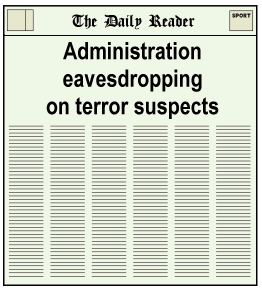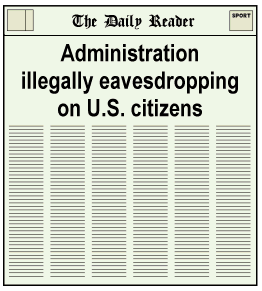Sunday, January 08, 2006
They didn't complain back then:Soldiers in the Bedwetter Brigade, like the boys over at Powerline, had no problem with news like this: 
There were many stories like that in the New York Times. Do a search on "eavesdropping al Qaeda" for 2002-2003 and you'll find entries like: ($) (emp add) The Nation: Terrorists' Talk; Why All That Chatter Doesn't Tell Us Much
THE nation was on high alert last week because of what officials and security experts said was a surge in intercepted communications -- ''chatter'' -- among suspected Qaeda operatives. Although officials said the intercepts indicated that terrorists might have moved closer to an attack, there was still not enough... And even Powerline got into the act last summer with this post celebrating the British spooks: (emp add) Al Qaeda Plot Against Parliament Foiled
British authorities apparently have thwarted a poison gas attack on Parliament which may have been timed to coincide with the 400th anniversary of Guy Fawkes' Gunpowder Plot. Computers seized in England and Pakistan in recent raids reportedly contained information on the terrorists' plan.
The London Times' account says:The encrypted e-mails are said to have been decoded with the help of an Al-Qaeda "supergrass". By revealing the terrorists' code he was also able to help MI5 and GCHQ, the government's eavesdropping centre at Cheltenham, to crack several more plots. I've never heard the term "supergrass," but it sounds like an informer or double agent. If so, that's great: al Qaeda has been notoriously hard to infiltrate.
UPDATE: A great many readers have written to confirm that in Britain, "grass" is slang for "informer," so a "supergrass" is a high-level informer or mole. Excellent. Notice there was no complaint from these guys when news was reported about "intercepted communications", "eavesdropping centre", or decoding "encrypted e-mails". Why not? But when a story breaks like this: 
Suddenly the Bedwetter Brigade is all upset over a disclosure that they claim will help al Qaeda. The answer to why they didn't compalin earlier about the intelligence operations is that folks like Powerline and Hugh Hewitt and the rest are simply supporters of Bush. That's all there is to it. There is no principle involved (except fealty to Bush). Something damages Bush politically, and they come out attacking with the panoply of charges that they always have ready (soft on terror, risk national security, disrespect/dishonor the presidency). NOTE ABOUT Bedwetter Brigade: This seems to be the new term for referring to those who magnify the terror threat all out of proportion. We like it. This blog has been on record for years asserting that al Qaeda is not a major threat. They conveyed the impression of being a big threat when they had an Air Force for a couple of hours (hijacking the planes), and, as Juan Cole aptly puts it, made a "theatrical" attack on the U.S. Proper analysis requires that the inherent capabilities of a foe be used to judge risk, a low-probablity event that happened to take place. Especially when that avenue has been subsequently closed (with secure cockpit doors). If it wasn't for the fact that the Twin Towers were hit - giving everybody the chance to watch the eventual collapse of the buildings - it's unlikely that Bush would have been able to play the Terrorist Threat Card. Would a terrorist attack in 2001 killing, say, 300 people in a mall, without cameras to show the real-time homicide, been enough to get the nation to support Bush's Iraq war? We doubt it.
posted by Quiddity at 1/08/2006 06:53:00 PM
7 comments
> al Qaeda is not a major threat
Would a Russian nuke detonated on a barge in New York harbor bother you?
The al Qaeda threat has been dealt with incompetently, but it's still major.
Nice work, uggabugga!
You correctly point out what we've known for years: it wasno surprise to anyone that communications have been monitored, and there is still no argument how the NY Times story damaged intelligence efforts.
BTW, brainhell, do you think that Russia's nuclear capacity continues to this day? I doubt Al Qaeda has (or shouldn't and wouldn't if we had a capable and competent administration) the capacity to hi-jack four civilian airliners. Adding Iran and N. Korea to the list of members of the Nuclear club is what this administration has failed at as well.
The purported "Al Queda Threat" is as much of a threat as the CIA wants it to be, as "Al Queda" IS CIA.
"The term supergrass is used in Northern Ireland to refer to arrested paramilitaries who divulged the identities of their compatriots to the Royal Ulster Constabulary in exchange for immunity from prosecution, essentially, an informer. In many cases, the supergrasses were granted immunity from prosecution, as well as substantial sums of money"
http://en.wikipedia.org/wiki/Supergrass_phenomenon
A supergrass is a paid informant.
> ...do you think that Russia's nuclear capacity continues to this day?
They have most all the Soviet-era nukes and could certainly blow up Vatican City for sure.
Your assumption seems to be that I support the Bush people or am generally right wing. But all I said was al Qaeda is dangerous. It's not Donald Rumsfeld you're jousting with here, it just ol' brainhell, who knows that al Qaeda is dangerous.
The Russian nuke would be obtained on the black market.
> ..."Al Queda" IS CIA.
They have some origins there, but they're their own group now.
Brainhell:
I guess it comes down to what you mean by "major threat". I do not doubt that al Qaeda would like to kill people, but they simply don't have the means to do much beyond hijacking planes and detonating conventional explosives.
You have to make an evaluation of what their capabilities are. What about the Basques? They'd like to blow up Madrid. What about other terrorist groups? What about home-grown Tim McVeigh types? Why do you consider al Qaeda a major threat and not the others?
I'm assuming you make a classification based on some criteria that includes a look at the infrastructure and means at a group's disposal. McVeigh had virtually nothing. What does al Qaeda have? Look at their attacks so far: a small boat to attack the Cole; a couple of car bombs in East Africa; hijacked planes for September 2001. It would seem reasonable that the only real asset these guys have are humans willing to make suicide attacks - but that they don't have any potent weaponry.
I doubt that the international system would allow any non-state group to get ahold of any really potent weapons. In a way, the al Qaeda attacks are proof that all they can do is go outside the military weaponry route.
If it can be shown that al Qaeda got close to getting something really potent, then I'd be concerned. But I haven't seen anything to that effect, and at some point you have to let the empirical data - no WMD attacks for years - represent the reality of the situation.
Quiddity,
> they simply don't have the means to do much beyond hijacking planes and detonating conventional explosives
They have plenty plenty cash, and the Russians have plenty plenty nukes and plenty plenty corruption. All it takes is one nuke in an American city (or maybe any city) for Bush to cancel the Constitution and suspend elections, and this country as we know it is done. Forever.
> ... Basques?
You just be joking. ETA has a pattern of NOT killing people.
> They'd like to blow up Madrid
They won't.
> What about other terrorist groups?
Gotta quash them too.
> ...Tim McVeigh types?
Funding.
> Why do you consider al Qaeda a major threat and not the others?
It's hard to evade your rhetorical box canyon of "the others" -- in which I must take on all hypotheticals -- so I'll stick to the real world. Aside from the reasons stated above, other terror groups are a major threat if they get hands on a nuke. The group with the best funding and most likely to do that is al Qaeda. But it doesn't matter so much which group it is -- if we ever started to take steps against al Qaeda, then we'd learn some techniques to use against all of them. Some day we should start.
> McVeigh had virtually nothing
Agreed. And the threat from those types is nowhere near as great as from al Qaeda.
> What does al Qaeda have?
Millions of dollars, access to martyrdom volunteers, access to Russians and Pakistanis and North Koreans who might sell them a bomb, and two hot and happening causes: Palestine and Iraq. And a track record, experience and expertise.
> I doubt that the international system would allow any non-state group to get ahold of any really potent weapons
Let's hope that you are correct, and that no mushroom cloud pierces your doubt. I'd say you're whistling in the dark.
> If it can be shown that al Qaeda got close to getting something really potent, then I'd be concerned
I think I just showed that.
> ... at some point you have to let the empirical data - no WMD attacks for years - represent the reality of the situation.
These guys are very patient and plan and execute over a period of years. Data about nuclear weapons was found in their leavings in Afghanistan. Yes, I do think that the current administration promotes lies and misconceptions about al Qaeda in order to create an atmosphere of fear -- but I also know that al Qaeda is resourceful, capable, and determined.
Let's hope that Manhattan is still there tomorrow morning, because I think that neither your approach nor George Bush's is protecting us.
Word out.
|